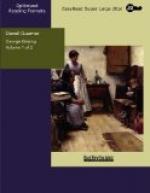“No; it drizzles.”
“Oh, how kind of you to take so much trouble on our account!”
Mrs. Wade went out into the darkness. It was as disagreeable a night as the time of year could produce; black overhead, slimy under foot, with a cold wind to dash the colder rain in one’s face. The walk home took more than half an hour, and she entered her cottage much fatigued. Without speaking to the girl who admitted her, she went upstairs to take off her out-of-door things; on coming down to the sitting-room, she found her lamp lit, her fire burning, and supper on the table—a glass of milk and some slices of bread and butter. Her friends would have felt astonishment and compassion had they learned how plain and slight was the fare that supported her; only by reducing her household expenditure to the strict minimum could she afford to dress in the manner of a lady, supply herself with a few papers and books, and keep up the appearances without which it is difficult to enjoy any society at all.
To-night she ate and drank with a bitter sense of her poverty and loneliness. Before her mind’s eye was the picture of Denzil Quarrier’s study—its luxury, brightness, wealth of volumes; and Denzil’s face made an inseparable part of the scene. That face had never ceased to occupy her imagination since the evening of his lecture at the Institute. Its haunting power was always greatest when she sat here alone in the stillness. This little room, in which she had known the pleasures of independence and retirement, seemed now but a prison. It was a mean dwelling, fit only for labouring folk; the red blind irritated her sight, and she had to turn away from it.
What a hope had come to her of a sudden last autumn! How recklessly she had indulged it, and how the disappointment rankled!
A disappointment which she could not accept with the resignation due to fate. At first she had done so; but then a singular surmise crept into her thoughts—a suspicion which came she knew not whence— and thereafter was no rest from fantastic suggestions. Her surmise did not remain baseless; evidence of undeniable strength came to its support, yet all was so vague—so unserviceable.
She opened the printed sheets that Quarrier had given her and for a few minutes read with interest. Then her eyes and thoughts wandered.
Her servant knocked and entered, asking if she should remove the supper-tray. In looking up at the girl, Mrs. Wade noticed red eyes and other traces of weeping.
“What is the matter?” she asked, sharply. “Have you any news?”
The girl answered with a faltering negative. She, too, had her unhappy story. A Polterham mechanic who made love to her lost his employment, went to London with hopes and promises, and now for more than half a year had given no sign of his existence. Mrs. Wade had been wont to speak sympathetically on the subject, but to-night it excited her anger.




